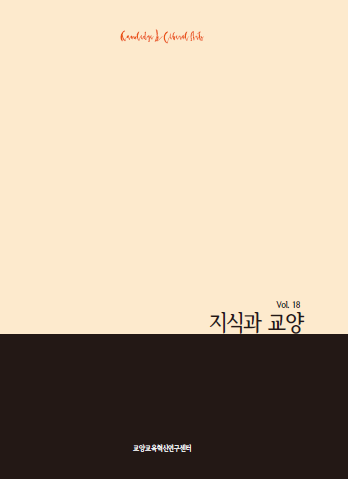- 영문명
- The Effects of Intergroup Dialogue Program for Multicultural Competency Enhancement of Undergraduate Students Majoring in Counseling Psychology
- 발행기관
- 목원대학교 교양교육혁신연구센터
- 저자명
- 고은영(Eunyoung Koh) 조민아(Mina Cho)
- 간행물 정보
- 『지식과 교양』제18호, 699~733쪽, 전체 35쪽
- 주제분류
- 복합학 > 학제간연구
- 파일형태
- 발행일자
- 2025.07.31

국문 초록
본 연구는 상담심리학 전공 학부생의 다문화 상담 역량 증진을 위한 집단간 대화(intergroup dialogue, IGD) 프로그램의 효과를 평가하는 것이다. 이를 통해 대학생의 다문화 상담 역량을 향상시키기 위한 구체적인 방안을 모색하고자 하는 것을 목적으로 한다. 이를 위해 D 광역시 소재 H대학교 상담심리학과에서 다문화 상담 교과목을 수강하는 학부생 51명 중 연구 참여에 동의한 43명을 대상으로 연구를 진행하였다. 연구 참여자들은 총 6회기로 구성된 집단간 대화 프로그램에 참여하였으며, 프로그램 효과 검증을 위해 다문화 감수성, 인종/민족적 소수자에 대한 인지적, 정의적 태도 및 행동 의도, 다문화 수용성 척도를 사용하여 프로그램 전과 후에 사전-사후 검사를 실시하였다. 또한 프로그램참여 후 작성된 소감문을 질적 내용 분석 및 빅데이터 분석(빅데이터 분석(단어 빈도, TF-IDF, 감성 분석)하여 프로그램의 효과를 심층적으로 탐색하였다.
양적 분석 결과, 집단간대화 프로그램 참여 후 연구 참여자들의 다문화 감수성, 인종/민족적 소수자에 대한 태도, 다문화 수용성 점수가 사전 검사에 비해 통계적으로 유의미하게 향상되었다. 질적 분석 결과, 참여자들은 인지적으로 자신과 타인, 상담자로서의 역할에 대한 인식이 확장되었으며('내담자', '상담', '문화' 키워드 중요도 부각), 정서적으로는 공감, 성장 등 긍정적 경험과 함께 두려움, 불안 등 성찰을 위한 정서적 불편감을 경험하였다. 행동적으로는 다문화 관련 지식/경험 증진, 자기 성찰, 소통 기술 향상, 사회적 책임감 인식 등 변화 의지를 나타냈다.
본 연구를 통해 상담심리 전공 학부생을 대상으로 실시한 집단간 대화프로그램이 다문화 감수성, 태도, 수용성을 향상시키고 다문화 상담 역량의 인지적, 정의적, 행동적 측면 증진에 효과적임을 확인하였다. 이는 다문화 상담자 양성 과정에서 경험적·성찰적 학습 방법으로서 집단간대화 프로그램의 활용 가능성과 교육적 의의를 시사한다.
영문 초록
The purpose of this study was to evaluate the effectiveness of an Intergroup Dialogue program designed to enhance the multicultural counseling competency of undergraduate students majoring in counseling psychology. Participants were 43 undergraduate students majoring in counseling psychology at H University in D Metropolitan City, selected from 51 students enrolled in a multicultural counseling course who consented to participate. Participants engaged in a 6-session Intergroup Dialogue program. Preand post-tests were conducted using the Intercultural Sensitivity Scale, scales for cognitive and affective attitudes towards racial/ethnic minorities, the Behavioral Intentions Index, and the Multicultural Receptivity Scale. Qualitative content analysis and big data analysis (word frequency, TF-IDF, sentiment analysis) of participants’ reflection notes were also performed to explore the program’s impact in depth.
Quantitative analysis revealed statistically significant improvements from pre-test to post-test in participants’ intercultural sensitivity, attitudes towards racial/ethnic minorities, and multicultural receptivity. Qualitative analysis indicated cognitive growth in awareness of self, others, and the counselor role (highlighted by the importance of keywords: ‘client’, ‘counseling’, ‘culture’). Affectively, participants reported positive experiences like empathy and growth, alongside emotional discomfort (e.g., fear, anxiety) conducive to reflection (indicated by a high frequency of negative sentiment words). Behaviorally, participants expressed intentions for change, including seeking knowledge/experience, self-reflection, improving communication skills, and recognizing social responsibility.
The Intergroup Dialogue program was effective in enhancing multicultural sensitivity, attitudes, and receptivity, and promoting cognitive, affective, and behavioral aspects of multicultural counseling competency among undergraduate counseling psychology students. This suggests the applicability and educational significance of Intergroup Dialogue program as an experiential and reflective learning method in counselor training programs.
목차
1. 서론
2. 이론적 배경
3. 연구의 방법
4. 연구의 결과
5. 결론 및 제언
키워드
해당간행물 수록 논문
참고문헌
최근 이용한 논문
교보eBook 첫 방문을 환영 합니다!

신규가입 혜택 지급이 완료 되었습니다.
바로 사용 가능한 교보e캐시 1,000원 (유효기간 7일)
지금 바로 교보eBook의 다양한 콘텐츠를 이용해 보세요!



